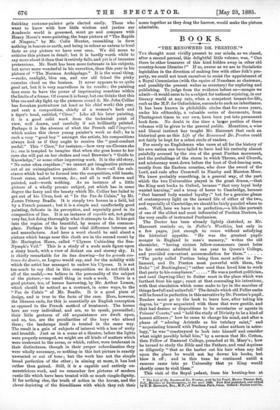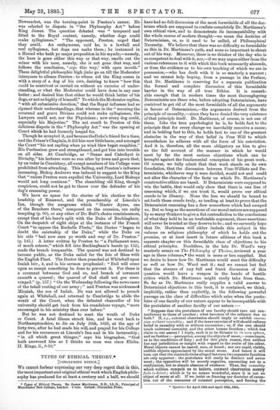BOOKS.
"THE RENOWNED DR. PRESTON."
Tux thought most vividly present to our minds, as we closed,. after a second perusal, this delightful little volume, was, " Can there be other treasures of this kind hidden away in other old country-house libraries ?" If so, averse as we are to Socialistic. legislation in the direction of making free with other folk's property, we could not trust ourselves to resist the appointment•of a Royal Commission (with the squire of Nuneham as chairman, and possibly the present writer as secretary) for exploring and publishing. To judge from the evidence before ns—meagre we admit—it would seem to be a subject for national rejoicing, in our literary world at any rate, when a competent tenant-for-life,. such as the M.P. for Oxfordshire, succeeds to such an inheritance. It has been known in philobiblic circles that for some years,. under his editorship, a valuable series of documents, from Plantagenet times to our own, have been put into permanent book form. No doubt in due time a larger portion of thesevolumes will be given to the general public. Meantime, a wise and liberal instinct has taught Mr. Harcourt that such an historical gem as this Life of the Renowned Dr. Preston could not fairly be kept for a select circle of readers.
For surely no Englishman who cares at all for the history of his own nation can have failed to have had his curiosity almost painfully aroused by the rise of the great Puritan movement,. and the prelndings of the storm in which Throne, and Church,. and aristocracy went down before the host of God-fearing men,. mostly from the Eastern counties, who drew the sword of the Lord, and rode after Cromwell to Naseby and Marston Moor. We knew probably something, in a general way, of the part which the two Universities played in the great drama,—that the King sent books to Oxford, because " that very loyal body wanted learning," and a troop of horse to Cambridge, because" that learned body wanted loyalty ;" but for a genuine gleam of contemporary light on the inward life of either of the two,. and especially of Cambridge, we should be fairly puzzled where to seek. Well, here we have it in perfection,—a life-like portrait of one of the ablest and most influential of Puritan Doctors, in the very cradle of instructed Puritanism.
The Doctor has been already lightly sketched, as Mr Harcourt reminds us, in Fuller's Worthies, but only in. a few pages, just enough to rouse without satisfying the historical appetite. "He was the greatest pupilmonger in England in man's memory," writes the old, chronicler, "having sixteen fellow-commoners (most heirs to fair estates) admitted in one year to Queen's College,.
and provided convenient accommodation for them." "The party called Puritan being then most active in Parliament, and Dr. Preston most powerful with them, the Duke" [of Buckingham] "rather used than loved him to work
that party to his compliance." " He was a perfect politician, and used (lapwing-like) to flutter most in the place which was. furthest from his eggs; exact at that concealing his intentions,. with that simulation which some make to lye in the marches of things lawfull and unlawf all." The details which old Fuller omits will be found in perfection in this narrative by Dr. Preston's pupilReaders must go to the book to learn how, after taking his degree, he " grew acquainted with those that were gentile, and that had desires or dispositions to be secretaries or agents in Princes' Courts," and " held the study of Divinity to be a kind of honest silliness ;" how he came to change his mind, and after a phase of " adoring Aristotle as his tutelary saint," and "acquainting himself with Ptolemy and other authors in astrology," he was " constreyned to look into himself and consider what might possibly befall him," by a sermon that Mr. Cotton, then Fellow of Emanuel College, preached at St. Mary's ; how he turned to study the Bible and the Fathers, and read Aquinas so diligently " that as the barber cat his hair when any fell upon the place he would not lay down his booke, but blow it off ; and in this tune he continued untill a rumour came into ye University that ye King would shortly come to visit them."
This visit of the Royal pedant, from his hunting-box at
Newmarket, was the turning-point in Preston's career. He was selected to dispute in "the Phylosophy Act" before King James. The question debated was " tempered and fitted to the Royal content, namely, whether dogs could make syllogismes." " The opponent, Preston, urged that they could. An enthymeme, said he, is a lawf all and real syllogisme, but dogs can make them ; he instanced in a Hound who hath ye major proposition in his mynde,—namely, the hare is gone either this way or that way, smells out the minor with his nose, namely, she is not gone that way, and follows the conclusion, ' ergo this way,' with open mouth." These delightful philosophic high jinks go on till the Moderator interposes to silence Preston : to whose aid the King comes in with a story of a dog of his own, desiring to know " how this could be contrived or carried on without an exercise of understanding, or what the Moderator could have done in any case better : and desired him that either he would think better of his dogs, or not so highly of himself." To which the Moderator replies, " with all submissive devotion," that the Royal influence had so ripened their understandings, that whereas in the " morning the reverend and grave Divines could not make syllogismes, the Lawyers could not, nor the Physicians ; now every dog could, especially his Majesties." The net result to Preston of this delicious dispute in the " Phylosophy Act" was the opening at Court which he had formerly longed for.
Though he accepted it, and became theDuke's friend for a time, and the Prince's Chaplain, it did him now littleharm, and amongst the Court "his not sayling when ye wind blew begat suspition." His Puritanism grew and strengthened, and got him into trouble on all sides. At Cambridge, as " Deane and Catechyst in Divinity," his lectures were so run after by town and gown that, by an order in Consistory, all except members of his College were prohibited from attending. This failing, and Preston's influence increasing, Bishop Andrews was induced to suggest to the King that " unless Preston were expelled the University, Lord Bishops would not long continue." The shambling old King, though suspicious, could not be got to throw over the defender of his dog's reasoning power.
We have no space for the stories of his election to the headship of Emanuel, and the preachership of Lincoln's Inn, though the anagrams which " Master Ayres, one of the Benchers there," composed on the occasion, are sadly tempting (p. 90), or any other of Dr. Bull's choice reminiscences, except that of his hero's split with the Duke of Buckingham. On the despatch of eight ships at the instance of the French Court "to oppose the Rochelle Fleete," the Doctor " began to doubt the sainteship of the Duke," while the Duke on his side " had now seen ye worth and way of Dr. Preston." (p. 145.) A letter written by Preston to " a Parliament man, of much esteem," which fell into Buckingham's hands (p. 152), made the breach irreparable. The quarrel was not destined to become public, as the Duke sailed for the Isle of Rhee with the English Fleet. The Doctor then preached at Whitehall upon Isaiah lxiv., 4, and in his sermon prophesied : " Evil will come upon us except something be done to prevent it. For there is a covenant betweene God and us, and breach of covenant causeth a quarrel ; the quarrel of God shall not goe unrevenged." (p. 157.) " On the Wednesday following the news came of the total! routing of our army ; " and Preston was nicknamed Micaiah, the son of Imlah. He was not allowed to preach again at Whitehall, and returned to Cambridge to abide the wrath of the Court, when the defeated chancellor of his university should get back from his scandalous voyage, "more encouraged in his ministry than ever before."
But he was not destined to meet the wrath of Duke or Court. A fatal illness struck him, and he went back to Northamptonshire, to die on July 20th, 1628, at the age of forty-two, after he had made his will, and prayed for his College and for his successors at Lincoln's Inn and in his lectureship ; " in all which great thinges," says his biographer, " God bath answered him as I thinke no man was since Elisha. II. Kings, ii., 9-10."



































 Previous page
Previous page